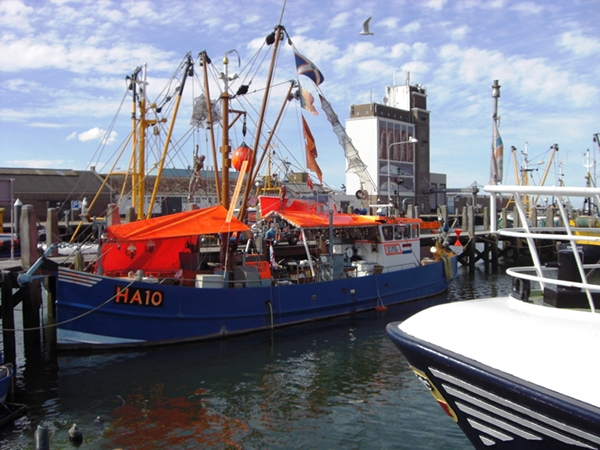Sharing a common language....

51:23.8N 03:38.2E Still in Breskens…. The Harbourmaster demanded attendance in the morning so the first task was to register and pay. Because the UK is not a member of the Schengen agreement this could have been an onerous requirement but wasn’t: no passports or ships documents had to be shown. What was interesting was the fee could not be paid by credit card – fortunately I had a 50 euro note that covered the 48.80 fee. The harbour master, (haven- meester) pooh-poohed the idea that getting back to Southampton against the wind would be a problem – he had taken 24 hours in a Farr 46 last weekend to get down-channel for the Round the Island Race last weekend, where they came 10th. The boat’s name was Tonnerre. Appropriate, really. He said that of the 1500 starters, 456 had retired in the first leg down to the Needles.
From there, off to collect The Lobster (I named him Adolf.) Further examples of the common language – past eateries (“eaten & drinken;) the chandlery, closed for its “lunch pauze;” The fish (vis) stall was on a moored fishing boat. The fisherman was gutting mackerel. I asked for a lobster: he asked if I wanted one that was alive. Yes, please. The weight? Between 1 and 1.2kg, please. He dived into his vivier and fished out a very splendid specimen: bang on 1.2kg. I was asked when he was to be cooked, and when it was clear that Adolf would be cooked this evening, he was wrapped in paper, soaked in water, and placed in a very stout plastic bag, sealed with strips of masking tape. By this time, a small group of people were watching from the wharf. When I said that I had named the lobster Adolf, one man said, as quick as a flash – don’t eat him! Everyone laughed. Once back on the boat Adolf sat getting chilled in the fridge until cooked – and by that time was so comatose that he didn’t kick up a fight as he went into the boiling water. He was VERY tasty with potatoes. aioli and creamed leeks. The claws have been reserved for lunch tomorrow.
After our own lunch-pauze, (tesco quiche and salad with fresh bread from the Plus supermarket in town,) we took the bikes out, firstly getting to the chandlery for the compulsory pilot books (in dutch, so not very helpful) then cycling upstream to Hoofdplaat. In a strong northwesterly, the journey out was easy: back against the wind less so. There are separate bike lanes, all marked and numbered; and all virtually flat! The distance was about 10 miles in total. Hoofdplaat was one of the early reclamation settlements, dating from 1790. On the way out we stopped under one of the big wind turbines, and Roger decided that they were noisier than he had expected. On the way back, route 23 was blocked by the police searching a citroen van, wearing blue plastic gloves – we had passed the van, chased by two police motor-bikes, on the way out. I asked if we could wheel the bikes through and was given a very dusty answer – no, we must turn round and go back via the main road. We continued to lurk, and eventually one of the policemen came across and explained to a dutch couple who were also caught by the blockage that there had been a shooting, and the way would be closed for some time! Once back I left Roger to the books and passage planning and went to explore the town. The Plus supermarket is very adequate, and I shall hope to find more such en route. The wine section was interesting: unlike in France there is a wide selection from Chile, South Africa, and Australia, as well as the usual eurpoean suspects. Compared with France, refreshingly open-minded. Off up the canal through Vlissingen to Middleburg and Veere tomorrow. |

